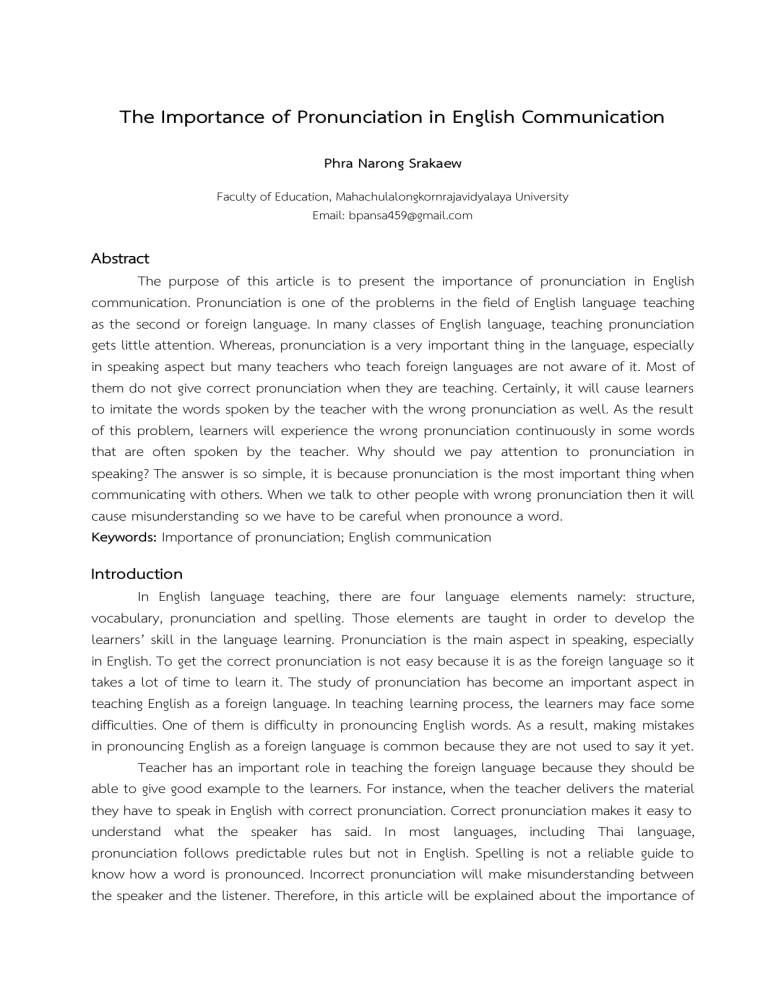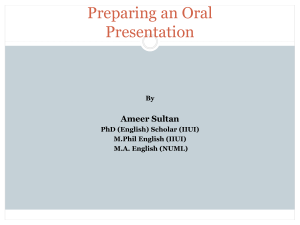
The Importance of Pronunciation in English Communication Phra Narong Srakaew Faculty of Education, Mahachulalongkornrajavidyalaya University Email: bpansa459@gmail.com Abstract The purpose of this article is to present the importance of pronunciation in English communication. Pronunciation is one of the problems in the field of English language teaching as the second or foreign language. In many classes of English language, teaching pronunciation gets little attention. Whereas, pronunciation is a very important thing in the language, especially in speaking aspect but many teachers who teach foreign languages are not aware of it. Most of them do not give correct pronunciation when they are teaching. Certainly, it will cause learners to imitate the words spoken by the teacher with the wrong pronunciation as well. As the result of this problem, learners will experience the wrong pronunciation continuously in some words that are often spoken by the teacher. Why should we pay attention to pronunciation in speaking? The answer is so simple, it is because pronunciation is the most important thing when communicating with others. When we talk to other people with wrong pronunciation then it will cause misunderstanding so we have to be careful when pronounce a word. Keywords: Importance of pronunciation; English communication Introduction In English language teaching, there are four language elements namely: structure, vocabulary, pronunciation and spelling. Those elements are taught in order to develop the learners’ skill in the language learning. Pronunciation is the main aspect in speaking, especially in English. To get the correct pronunciation is not easy because it is as the foreign language so it takes a lot of time to learn it. The study of pronunciation has become an important aspect in teaching English as a foreign language. In teaching learning process, the learners may face some difficulties. One of them is difficulty in pronouncing English words. As a result, making mistakes in pronouncing English as a foreign language is common because they are not used to say it yet. Teacher has an important role in teaching the foreign language because they should be able to give good example to the learners. For instance, when the teacher delivers the material they have to speak in English with correct pronunciation. Correct pronunciation makes it easy to understand what the speaker has said. In most languages, including Thai language, pronunciation follows predictable rules but not in English. Spelling is not a reliable guide to know how a word is pronounced. Incorrect pronunciation will make misunderstanding between the speaker and the listener. Therefore, in this article will be explained about the importance of 12 | The Importance of Pronunciation in English Communication correct pronunciation in speaking as a foreign language, the reason why pronunciation is difficult to learn and strategies of teaching pronunciation. 1. Why is pronunciation important in speaking? Pronunciation is an essential thing in good communication because the wrong pronunciation will lead to misunderstanding and negative impression with the other person. According to Suwartono (2006), Pronunciation is an essential part in a language, for the nature of language is spoken. Pronunciation is the most important and difficult problem that nonnative English speakers have to face when studying English. A common mistake made by many international students who study English as a foreign language is not paying attention to English pronunciation well. Most of students underestimate the importance of pronunciation because they consider that the pronunciation is less important than other English aspects such as grammar, lexicology and vocabulary. Many cases of understanding in communication were caused by the mispronouncing of words or the improper intonation. Many words in English that have pronunciation are almost same or may be the same but have different meaning. Let’s take a few example: if someone pronounces the words shit, sheet, sit, seat; Dessert with Desert; Sent with Cent; Find with fine; Ball with Bawl; Their with There; Beach with Bitch; Advise with Advice. In addition, correct pronunciation can also give a plus value to those who master it. What do you think which makes people get amazed of your English language when their hear you speaking? Your grammar, pronunciation or vocabulary? The answer is certainly pronunciation, because it is the main aspect in speaking. Therefore, it has become more and more obvious that pronunciation cannot be underestimated. It must become one’s priority while she/he is learning English. At least, they have to give the same proportion of time and attention to pronunciation as well as they do to grammar and vocabulary. 2. Why is Pronunciation difficult to learn? Pronunciation is a part of language aspects that the most difficult to learn, especially when it becomes a foreign language. To get the correct pronunciation takes a tough effort and has to practice constantly. Gilakjani & Ahmadi (2011) said that Pronunciation is viewed as a subskill of speaking. Generally, if we want to change the way a learner pronounces words, we have to change the way they think about the component sounds of those words. Some of languages, in the term of pronunciation, most of the words are pronounced according to the word, this rule does not apply to English. This is because in English the word and pronunciation of that word is different. For instance, the word tough, this word is pronounced with /tʌf/. It makes the learners have difficulty when they learn English as a foreign language. Another things that affect the difficulty in learning correct English pronunciation is the difference of sounds. This argument also supported by Gilakjani & Ahmadi (2011) that: วารสารการสอนภาษาอังกฤษ ปีที่ 2 ฉบับที่ 2 | 13 “ In many of the cases in which a learner seems to have trouble pronouncing a particular sound, it is easy to demonstrate that the learner commonly pronounces a perfectly acceptable version of the sound in another context.” Take for example, Thai people is difficult to say “th” sound. It will make they are difficult to learn English pronunciation as a foreign language. According to Gilakjani & Ahmadi (2011), there are some factors that make the reason why English pronunciation is difficult to learn, namely: accent; stress, intonation and rhytm; motivation and exposure; attitude; instruction; age; personality; and mother tongue influence. These factors are likely to affect the difficulty of learning English pronunciation, especially those who make English as a foreign language. In conclusion, the reason why pronunciation is difficult to learn is because in the foreign language has many phonemes (sounds) that are not in the mother tongue or the first language of the learners. This problem will cause difficulties in pronunciation of the foreign language phonemes and these difficulties will lead to an error in pronunciation. The impact of phonemes pronunciation error in a foreign language will lead to misunderstanding of meaning and it will cause difficulties in communicating. 3. What are the strategies of teaching pronunciation? Learning foreign language is not easy because there are so many things to be mastered. The ability to speak is one of the most important things, this is because to facilitate people in communicating. When speaking in a foreign language, especially English then the most noticed thing is pronunciation. If someone makes a mistake on pronunciation it will be directly known to the listener and this may cause misunderstanding in the meaning. This happens because in English not a few words that have pronunciation almost the same but has a different meaning. Therefore, pronunciation in speaking has a very important role. Related to this matter, the role of the teacher as a model in the teaching of foreign languages must have good skills, especially in correct English so it can be an example by learners in good language. Teaching pronunciation in English is not easy and requires a lot of attention, teachers should have some strategies in the learning process. According to Sholeh & Muhaji (2015: 704) there are some pronunciation learning strategies. The first is give priority to help fix pronunciation of learners every time they got into trouble with their pronunciation with principle of 'little but often'. The second strategy is to use repetitive drilling when teaching pronunciation because it is the most effective way to make learners easy to learn. The third is make sure that learners hear pronunciation is true and clear, maybe in the learning process should be given phonetic transcription to make it easier and clearer. The fourth is pay particular attention to words that have a way of writing that inconsistent because many words in English that the writing and pronunciation is different. The fifth is focus on the most sounds influences the learner's understanding, for example, the consonant sound especially in the beginning and also the end of word is sometimes more important than the vowel sound. Take for example, in the word of tree and three. The sixth is 14 | The Importance of Pronunciation in English Communication pay special attention to schwa (ǝ) as it is the most common vocal sound in English. The seventh strategy is always give the word stress on new vocabulary. The eighth is always remind the learners to more careful when pronounce the words in English with regard to the correct pronunciation. The ninth is always remind learners to always check the correct way of pronunciation in the dictionary. The last strategy is always emphasize the learners about the importance of correct pronunciation in communicating using English. 4. The Importance of Pronunciation in English Communication Pronunciation is an important part of the English language which helps in communicating well, helps in achieving success in the US classroom, boosts language learners’ confidence, and even helps them in socialization. According to Cakir and Baytar (2014:100), pronunciation impacts the attitude held by language learners, and also, accurate pronunciation of English words helps in overcoming anxiety in the communication process. Similarly, Prashant (2018:15) articulates the idea of effective communication in any language is believed to emerge with proper pronunciation which helps in further understanding the association and use of words. Likewise, the functionality of the pronunciation with the learnability associated with the complex use of language without which could limit individuals to communicate effectively (Bakar, 2015:144). These studies demonstrate the significance of pronunciation in English, which allows individuals to communicate effectively, assists them in obtaining success, enhances their confidence, and assists them in socializing. Proper pronunciation also encourages language learners to use the target language more frequently and with more confidence. Barker and Abdullah (2015) addressed the issue associated with pronunciation and investigated it as a means of the requirement for non-native speakers. The authors conducted the research with the help of a questionnaire in learning the importance of accurate English pronunciation. The findings demonstrate that accuracy in pronunciation is perceived as positive reinforcement. The authors suggest that this discovery might be used to measure students' perceptions of their English language competence and could even be used to improve learners' competency while also assisting trainers in ensuring it as a method of improving learners' capability of utilizing English. Similarly, the article presented by Prashant (2018), addresses the sociability issue associated with pronunciation in the English language. The author studied the English language and its evolution of becoming the local language, associating it with the sociability of the individuals. The particular study was focused on the linguistic aspect associated with the language with the author also focusing on a literature review. The findings indicated that the capability of pronouncing properly helps in gaining confidence and also helps in presenting the exact meaning as changing the pronunciation changes the meaning associated with the word. The findings in an article by Cakir and Baytar (2014:106) point out the intelligibility issue which is defined as “the degree to which a speaker’s utterance is understood by a listener” The authors addressed the issue associated with late learners and the phonetic development based วารสารการสอนภาษาอังกฤษ ปีที่ 2 ฉบับที่ 2 | 15 on the first language which could impede English pronunciation. The purpose of this study was to understand the attitude toward foreign languages and the importance of pronunciation in oral communication. The study included a total of 58 participants from the English preparation program. The findings illustrated that learners are able to properly use phonetics even after the critical age when this skill is taught as part of language instruction in an effective way. Similarly, Zhang and Yin (2009) discuss the importance of pronunciation for communication in English addressing the frequent issue associated with Chinese learners. They focus on the phonetic element associated with English and how it is used and argue that accurate pronunciation along with intonation directly impacts the meaning associated with the words and how they are perceived. Zhang and Yin (2009) conclude with the idea that the first language does interfere with learning English, but could be improved with sufficient knowledge and instruction of phonology along with phonetics. Overall, pronunciation is accepted as one of the essential elements that help people feel confident when they communicate and get their message across effectively. Using inaccurate pronunciation may cause some misunderstandings, and it can be minimized through effective instruction of pronunciation. Knowledge from the Study Learning a new language is not an easy task. There are many things to consider, like difficult grammar rules, extra vocabulary, and even new pronunciation. As an English Second Language (ESL) learner, you might feel nervous about speaking and participating in long conversations. That’s totally normal! Fortunately, improving your pronunciation can help make you feel more comfortable during these times. Practicing your pronunciation is an important part of your studies. Here are some reasons why this is a great idea! 16 | The Importance of Pronunciation in English Communication 1) Using Good Pronunciation Helps Others Understand You More Quickly Having difficulty speaking and pronouncing words properly are common problems for many English language students. That’s because English has many difficult sounds, such as “th” and “ch.” It’s important to keep in mind that more speaking practice does not always mean more pronunciation practice. Those two subjects are separate. Speaking practice helps you learn how to make natural sentences in real conversations. Pronunciation is all about making sure you sound clear and are easy to understand. By using the correct sounds when you speak, others can quickly understand what you’re trying to say. If you are great at grammar and know many different words, good pronunciation will help others hear and understand you even more clearly. 2. Having Good Pronunciation Makes Learning English as a Second Language Easier As you’ll soon find out, learning English as a second language can be lots of fun when you make great progress. Believe it or not, improving your pronunciation can help you learn English more easily. This is because pronunciation forces you to listen to speakers more carefully, focusing on how they make the right sounds when they speak. By listening to how natural sentences sound, you are more likely to make them yourself. Besides, the more you listen to these sentences, the easier it becomes for you to understand and get used to them. Don’t let your pronunciation stop you from feeling confident in your speaking skills. The saying “practice makes perfect” really is true. For example, ASC’s new pronunciation class gives you a chance to practice difficult words and sounds. Keep trying, and you’ll definitely see great results! 3. Good Pronunciation Can Help Improve Your Social Skills If you’re studying at an ESL school, then you might be looking forward to meeting new people and having all kinds of interesting conversations together. Of course, it can sometimes be hard to feel confident speaking in another language. You might feel shy at first or worry about making a mistake or being misunderstood. Fortunately, having good pronunciation will make you more confident. You’ll be able to participate in conversations, getting to know your classmates and those around you much better. In this way, having good pronunciation can even help you make friends more quickly. วารสารการสอนภาษาอังกฤษ ปีที่ 2 ฉบับที่ 2 | 17 Speaking will no longer be a hard activity—but a fun way to improve your English while making meaningful connections with other people. Conclusion In English language teaching, there are four language elements namely: structure, vocabulary, pronunciation and spelling. The most important thing is pronunciation because it has a very important role, especially in English. However, most of people do not care about the correct pronunciation in speaking. When we speak with incorrect pronunciation so it will lead to misunderstanding. In English, most of words have similar pronunciation but have different meaning so we have to pay attention with pronunciation. Teachers play an important role in pronunciation learning because when the teacher deliver or explain the material with incorrect pronunciation so it will lead the students to speak with incorrect pronunciation too. In teaching learning process the teacher should have some strategies. References Bakar, Z. A., & Abdullah, M. R. (2015). Importance of correct pronunciation in spoken English: Dimension of second language learners’ perspective. Pertanika Journal of Social Sciences and Humanities, 23(8), 143-158. Cakir, I. & Baytar, B. 2014. “Foreign language learners’ views on the importance of learning the target language pronunciation”. Journal of Language and Linguistic Studies. Vol. 10(1): 99-110. Retrieved January 14, 2023 from: http://www.jlls.org/index.php/jlls/article/view Çakır, İ., & Baytar, B. (2014). Foreign language learners’ views on the importance of learning the target language pronunciation. Journal of Language and Linguistic Studies, 10(1), 99110. Gilakjani, A. P. & Ahmadi, M. R. 2011. “Why is Pronunciation so difficult to learn?”. English Language Teaching. Vol. 4(3), pp: 74-83. Retrieved January 14, 2023 from: https://files.eric.ed.gov/fulltext/EJ1080742.pdf on November, 19th 2017. ----------. 2016. “English pronunciation Instruction: A Literature Review”. International Journal of Research in English Education. Vol. 1(1), pp: 1-6. Retrieved January 14, 2023 from: https://ijreeonline.com/article-1-21-en.pdf on November, 19th 2017. Marza, N. E. 2014. “Pronunciation and Comprehension of Oral English in the English as a Foreign Language”. Journal of Language Teaching and Research. Vol. 5(2): 262-273. Retrieved January 14, 2023 from: http://www.academypublication.com/issues/past/jltr/vol05/02 Prashant, P. D. (2018). Importance of pronunciation in English Language communication. Research Papers in Economics, 7(2), 15-20. 18 | The Importance of Pronunciation in English Communication Sholeh, A. & Muhaji, U. 2015. “Pronunciation difficulties encountered by EFL students in Indonesia”. Jurnal Inspiraasi Pendidikan. pp: 698-707. Retrieved January 14, 2023 from: https://scholar.google.co.id/scholar?q=Pronunciation+difficulties+encoun Suwartono. (2006). “Pembelajaran Pelafalan Bahasa Inggris melalui Teknik Sulih Suara”. Jurnal Ilmiah Pendidikan. No. 1, pp: 41-56. Retrieved January 14, 2023 from: https://journal.uny.ac.id/index.php/cp/article/view/8564 on November,18th 2017.




